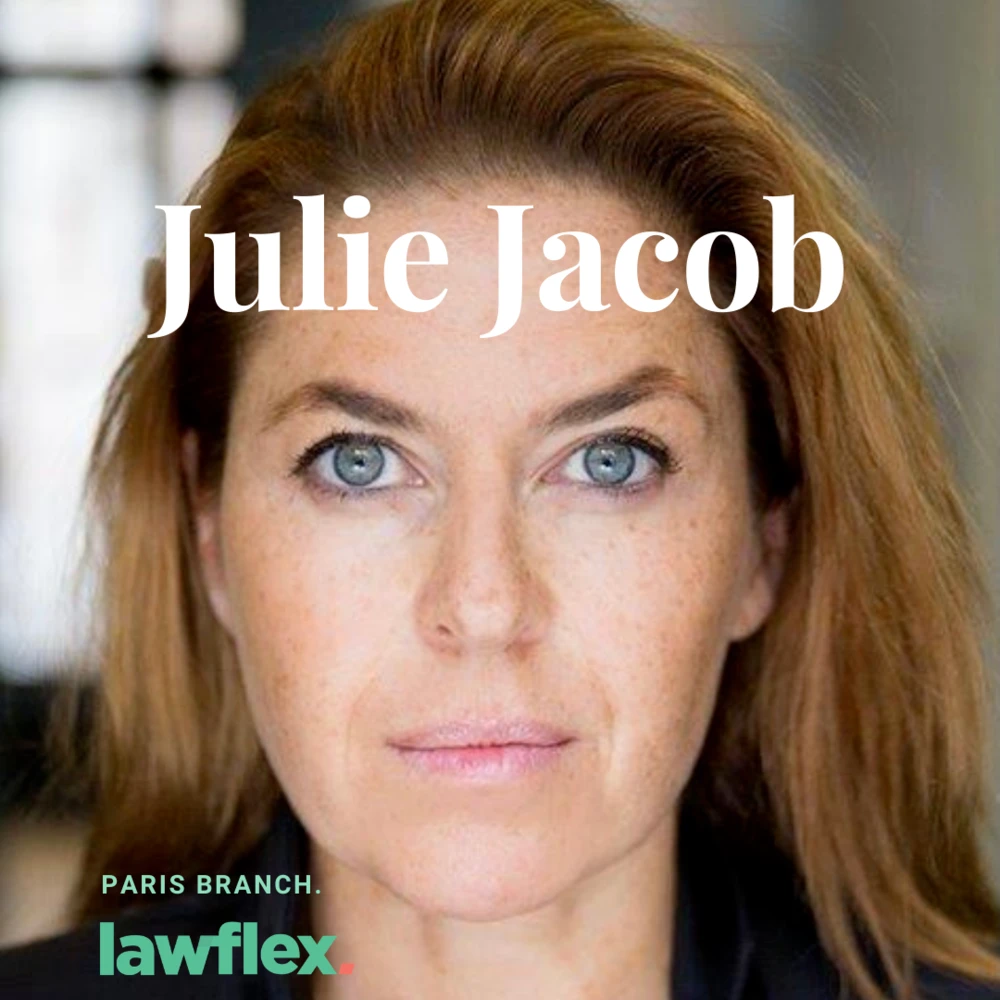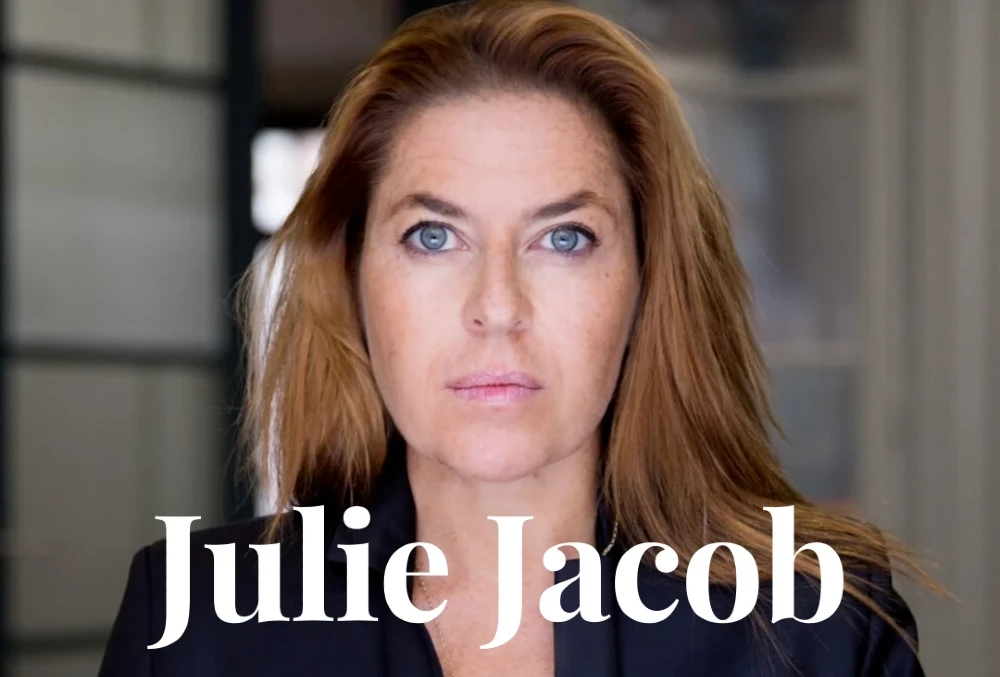Julie’s firm remains a shining example of how innovative legal teams can be, and we are proud to announce that, as of December 15th, Jacob Avocats will officially be joining LawFlex as part of our global expansion. LawFlex believes strongly in being able to offer unique flexible legal solutions anywhere, anytime; our expansion into international markets will help us achieve just this. France especially has established itself as a key player in the New Law world, making Jacob Avocats a real asset to LawFlex’s European legal talent pool. With Julie Jacob at the helm of our Paris branch, we’re anticipating a new level of innovation.
Julie has a sharp understanding of what each client needs from her firm, and proudly vouches for the fact that each lawyer in the firm is just as receptive to the specific needs of their clients.
With that in mind, we spoke to Julie about the incoming changes the legal industry has seen, and how notably COVID-19 has accelerated the industry’s shift into innovation.

True Innovator
Julie Jacob is a French lawyer, qualified for 25 years in Paris. She has specializations in the areas of technology, digital and data. Julie Jacob is a true innovator in the legal-sphere, and has established an impressive boutique law firm in Paris called Jacob Avocats
How would you describe the legal landscape in France?
You know Shany, legal matters in France are becoming more and more complex, and numerous in sheer quantity. We can look at the evolution of law, with technology law, Data, compliance, Entertainment, labour law, etc… everything that regards e-commerce (B2B and B2C commerce). It needs more and more high expertise, complex issues and high calibre lawyers.
The world is clearly changing, and legal matters move quickly. Because of that, legal matters require more flexibility, more versatility on behalf of lawyers, as well as on behalf of legal departments and law firms.
That’s quite a comprehensive outlook. Nowadays, not just in France–but around the world as well–we’re seeing a pervasive need to solve a range of legal problems with creative legal solutions. Do you think the Alternative Legal Services industry is capable of providing flexible/creative legal solutions?
In France, legal departments and law firms are seeing the need to quickly request lawyers for several different occasions. They’re seeing the need for lawyers with very specific legal expertise, and seeing to maximize growth and efficiency in their activities. So the solution to hire flexible legal talent is so important; as is the ability to be innovative, which ALSPs are.
Alternative Legal services platform offer flexible solutions tailored to each needs.
Innovation is definitely one of the hot topics of the legal industry right now. Whoever is the most innovative seems to be hailed as ‘the best’. LawFlex, for instance, is an ALSP (Alternative Legal Service Provider) that offers a variety of innovative legal services (among legal staffing), but just how “alternative” do you think the path of legal outsourcing is? Or is it perhaps becoming normalized in your opinion?
We’re sort of in the beginning stages of seeing it [legal outsourcing] become normalized. With uncertainty (ie the covid crisis), we’ve seen an acceleration of these changes. We’ve seen a digital revolution of sorts in each area of the economy.
The digitization of work flows in the pandemic has given us opportunities for remote work. The many transformations we’re now seeing with digitalization is a sign that the legal industry is moving. It’s really moving. So now, firms like ours – and LawFlex – are trying to move with it, and the digital revolution.
We all have to adapt to the post pandemic business environment.
Why do you think global ALSPs (companies like LawFlex, Axiom, Elevate, EY, Deloitte) are important to the overall legal industry?
JJ: Flexible global ALSPs are important because, as I mentioned before, COVID-19 has really accelerated the need for change. Right now, we need to create law “on demand”. We have to be flexible, like our clients. I think that right now is the time for lawyers, legal departments, and law firms to be adaptable, and accepting of the digital revolution. I’m very happy, and excited honestly for the transformation of the legal industry.
Costs and efficiency for clients in using flexible legal ressource is obvious.
You mentioned that clients are ready to adapt to this digital age that has been accelerated in the pandemic. But are there any other ways you think the pandemic has impacted the legal landscape?
You know, I think each industry has experienced an acceleration in change and some sort of transformation. Remote working in particular has become a total norm. So I don’t think law is different.
You can use things like remote working to actually strategically boost various sectors of activity in your legal teams. I think it’s also about working with a kind of agility. This concept of “law on demand” has been working very well for us.
But of course we recognize there are also occasional needs to meet with customers on site, to strengthen interpersonal relationships. In my opinion though, we can optimize working in this “new norm” with both on site meetings and remote working. We can simply organize new ways of working, especially with all the tools we have available to us now, like Zoom, Google Meets, online calendars, etcetera. It’s really not a problem, to adapt.
By merging digital and in-person aspects of working, we can definitely maintain a good professional proximity with our clients.
In a recent study, 95% of respondents reported that they believed the pandemic has changed remote working practices at their firms for good. Do you believe there are aspects to the industry that have changed for good as a result of the pandemic?
Well I think that certainly remote working and digitalization are benefits, and good changes, but I also think it’s important we always try to preserve human relationships, which can sometimes be lost in digital transformations. The time for certain changes has come; technology has become essential in our daily lives, but, technology does not solve all problems. We need to preserve human relationships, even if it’s through Zoom / Teams like what you and me are doing right now! It’s important to see each other, to speak to each other, and perhaps even to meet each other on site if possible.
So I think we can mix a variety of working methods, to create optimal and customized experiences for our clients. We don’t need to be married to the idea of just remote working or just on site working. We can organize ourselves by a mix of all these possibilities for working. Regardless of which options we go for, we must always keep human relationships at the front of our minds; because collaboration and a good understanding of the needs of the other person are so crucial.
(Shany) – You know I really think that the aspect of human relationships doesn’t really get talked about much nowadays, perhaps because we’re so focused on advancing technology in every industry. But you’re absolutely right; the legal industry is sort of notorious for its hectic working schedules, its unchanging and rigid nature. It’s about time the industry accepted that change is important, as are the preservation of human relationships through strategies like connection and flexibility.
(Julie) – Yes–and you know, we’re seeing that evolution and change has touched the sector of regulation, Data compliance, labour law, environmental law… And sometimes, you just need someone with a very specific background in an area of law, so flexibility is such a great option in these instances, where you need additional temporary legal talent fast.
Flexibility can really be the answer to many different legal problems, as you pointed out. It’s a very valid solution for many issues. So why is legal outsourcing a good option for legal departments?
You can choose very specific legal talent, for your exact needs. It’s an interesting solution, and offers you a strategic position, once you equip your legal team with specific expertise.
What qualities are clients looking for in lawyers nowadays, as opposed to, let’s say, 10 years ago?
In my law firm in France, I ask of the lawyers in my team to have the following qualities: first of all, very specialized in a particular field of the Law (specialist legal skills); then flexibility; and then, reactivity.
And that’s simply because I don’t think a lawyer can be a “generalist” in terms of knowing every part of every kind of law. It’s just not possible.
So it’s much more useful to have a lawyer who has a specialization of some sort, who understands the nuance of a specific area of the law very well. Regulations are always moving, becoming more and more complex; which means that lawyers who specialize in specific areas will be more likely to stay on top of such changes.
But if I’m being honest, I think perhaps the most important quality in a modern lawyer is a good understanding of human relationships; being able to grasp exactly what it is the client needs. Because ultimately, understanding human relationships is also a business-oriented strategy, one that sets your legal team apart from others.
The specification of experience is such a crucial quality of a modern lawyer, you’re right. It’s just not plausible for a single lawyer to be a “jack of all trades”, and as you said it’s more important for a lawyer to have knowledge in a very specific part of the law.
This brings me to my last question, which is: how would you define the lawyer of today?
The lawyer of today is really specialized in their activities, with a business-oriented vision, and is able to integrate themselves into a team. Because fact is, in law, we can not work alone. We need a team, and to be near each other. In this aspect, I actually think digitalization can be a great tool; you know, you are in Canada, and I am in France! So I think it’s the best demonstration that we can work collaboratively, and work “near” each other.
Perhaps technology really can bring us closer, and not only as business partners and co-workers, but also as humans, and individuals. Julie, it was such a pleasure speaking with you.
We are waiting for you here in Paris, Shany!
I would love to be there tomorrow if I could! Trust me, I’ll be dreaming of sunny Paris.

